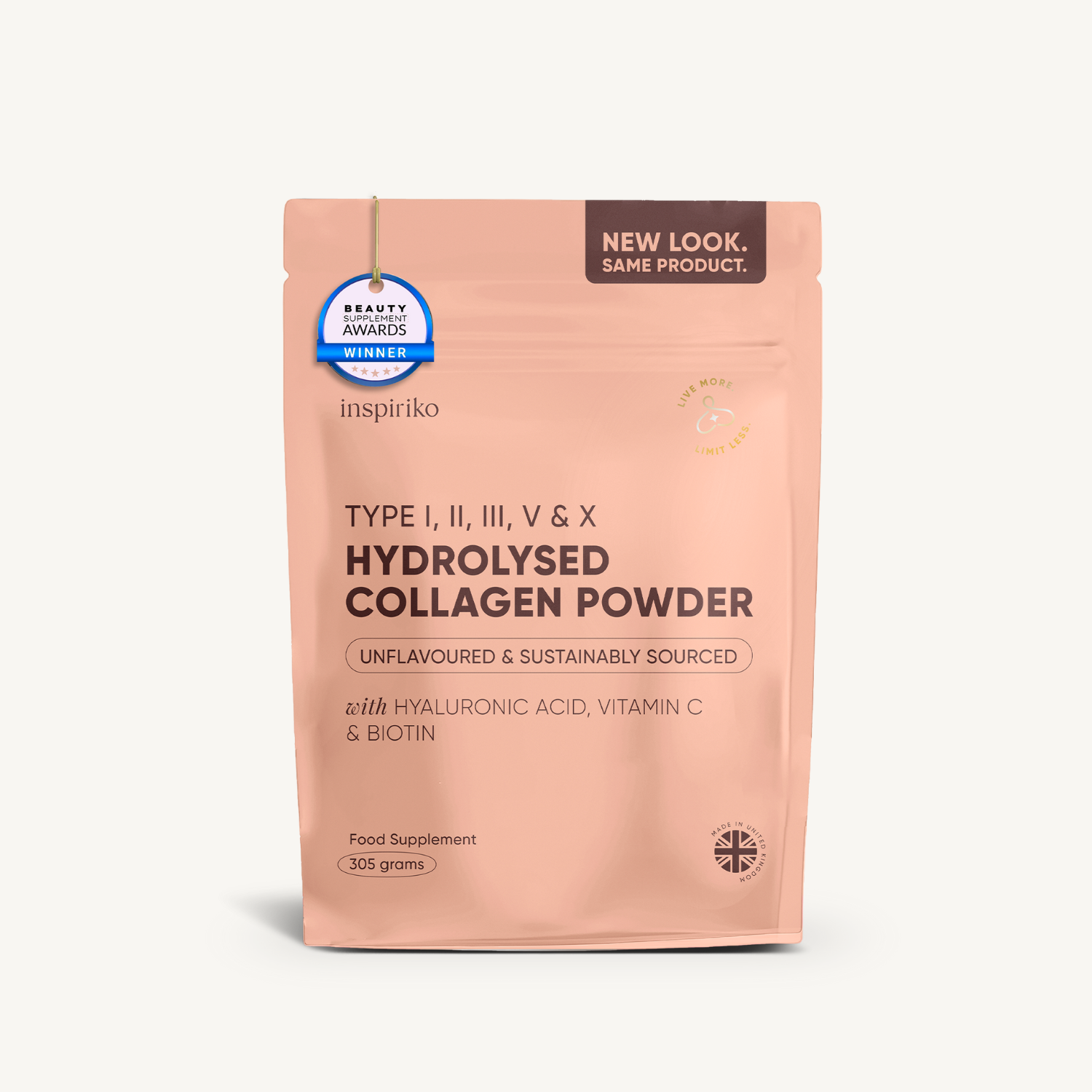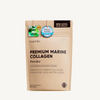Collagen supplements have gained immense popularity in recent years for their potential benefits in promoting healthy skin, hair, and nails, helping you look flawless even during the transformative stage of menopause. Why is menopause relevant when it comes to collagen? Well, as you go through this phase in life, the decline in estrogen levels can lead to a reduction in collagen production (1), resulting in changes in the skin's elasticity, bone density, and joint health.
Therefore, incorporating collagen supplements into your routine during menopause can be particularly beneficial for your integral health. However, with all of the options available in the market, it's easy to make mistakes when purchasing collagen products and end up with a supplement that’s not right for you. In this article, we will explore the 5 most common mistakes people make when buying collagen supplements while providing you with the best tips to choose the right one for your needs.
What does collagen do?
Let's briefly understand the crucial role collagen plays in supporting many aspects of your health. Collagen is a vital protein that provides structure and strength to your body, acting as a building block for the skin, bones, tendons, ligaments, and even the gut lining.
Let’s start with the most well-known role collagen plays in your body: skin health. Collagen plays a significant role in maintaining its youthful appearance by providing elasticity, hydration, and firmness (2). As we age, our natural collagen production declines, resulting in these wrinkles and saggy skin. Thus, collagen supplements aim to replenish and support your body's collagen levels, contributing to healthier, more vibrant skin.
In addition to its impact on the skin, collagen also plays a crucial role in promoting gut health. The gut lining consists of a layer of cells held together by collagen, which helps to maintain its integrity and barrier function (3). Furthermore, collagen is essential for maintaining joint health and mobility. It acts as a cushion and lubricant for the joints, reducing friction and supporting their smooth movement and flexibility (4). Finally, collagen is known to promote strong and healthy hair and nails (5). The protein is a key component of the hair and nail structure, providing strength, resilience, and healthy growth. By incorporating collagen supplements into your routine, you may notice improved hair thickness, reduced brittleness, and enhanced nail health.
5 most common mistakes people make when buying collagen products:
When it comes to diving into the world of collagen products, it's essential to navigate with caution, avoiding some pitfalls that many unsuspecting buyers sometimes fall into. Here we present you with the 5 most common mistakes people make when buying collagen supplements:
Not checking the source & Not looking at the type of collagen
Not all collagen supplements are created equal. A common mistake is disregarding the source and type of collagen used in the product you’re choosing. Collagen can be derived from:
- Bovine collagen is primarily composed of type I and type III collagen and is often used to promote healthy skin, support joint health, and strengthen bones.
- Marine collagen is sourced from fish, such as cod or salmon, and primarily consists of type I collagen and is commonly used to promote skin elasticity, strengthen hair and nails, and support joint health.
- Porcine collagen is derived from the skin and bones of pigs and is also rich in type I and type III collagen.
In addition to different sources of collagen, there are also various types of collagen that target specific areas of the body:
- Type I Collagen: Found in the skin, bones, tendons, and ligaments, it provides structural support and elasticity to the skin, contributes to bone strength and helps maintain the integrity of connective tissues.
- Type II Collagen: Found in cartilage, it is crucial for joint health, supporting smooth movement and reducing discomfort.
- Type III Collagen: Often found alongside type I collagen, it is involved in the development of newly formed tissues, supporting the structure and function of organs, muscles, and blood vessels.
As you can see, it’s crucial to carefully choose the type of collagen you’re going to take so it truly suits your needs and preferences.
Overlooking the dosage
You should not overlook the dosage either! Many people assume that taking more collagen will yield better and faster results, but this is not necessarily the case. Taking an excessive amount of collagen may potentially be wasteful or even lead to unwanted side effects, like mild diarrhea or rashes (6). On the other hand, taking too little collagen may not provide the desired effects or meet your specific needs.
To avoid this mistake, carefully read the label of the collagen supplement and follow the recommended dosage guidelines. The dosage can vary depending on factors such as:
- age,
- weight,
- health condition,
- and specific goals.
If you're unsure about the appropriate dosage for your situation, it's always advisable to consult with a healthcare professional or a registered dietitian who can provide personalized guidance.
Ignoring additives and fillers
Many collagen supplements come blended with other ingredients to enhance their efficacy, such as vitamin C. It's essential to read the product label and carefully consider these additional ingredients, looking out for allergens, artificial additives, fillers, or excessive amounts of sugar.
Expecting immediate results
Last but not least, it's crucial to be cautious and skeptical of exaggerated promises, such as "instant wrinkle reduction" or "overnight transformation." Remember that collagen supplements work gradually, and results vary from person to person. Look for products backed by scientific evidence and reputable brands that prioritize transparency.
How to choose the right collagen supplement for your needs?
Whether you seek to enhance your skin's radiance, strengthen your joints, or promote overall wellness, selecting the right collagen supplement requires a discerning eye. Here are the key factors to consider:
Determine Your Goals
Do you want to improve skin elasticity, promote joint health, or support your gut? Understanding your goals will help you choose a collagen supplement tailored to your needs. For example, if your main focus is on improving skin elasticity and youth, a supplement containing type I and III collagen is the best choice.
Meanwhile, if you are concerned about joint health and mobility, a supplement containing type II collagen would be more beneficial. Some collagen supplements combine multiple types of collagen to provide comprehensive support for multiple areas of the body, so pay attention!
Research the Brand
Look for reputable brands that prioritize transparency, use high-quality ingredients, and follow ethical sourcing practices. Check customer reviews and ratings to gauge their reputation and customer satisfaction. Also, don’t forget to carefully examine the product label and ensure that the collagen supplement is free from allergens, unnecessary additives, and artificial ingredients.
Consider Bioavailability & Dosage
Opt for collagen supplements that have high bioavailability, meaning they can be easily absorbed and utilized by the body. For instance, hydrolyzed collagen peptides are smaller molecules that are more easily absorbed,
Additionally, keep in mind that collagen supplements may come in different forms, such as powders, capsules, or liquids. Typically, most collagen supplements suggest a daily dosage ranging from 5 to 10 grams, often divided into multiple servings throughout the day for better absorption. However, consider that dosage instructions may vary depending on the form of the supplement, so it's important to understand the correct method of consumption to ensure optimal absorption and effectiveness.
Conclusion
All in all, incorporating collagen supplements into your routine can be life-changing, especially during menopause. But you won’t see true results if you choose the wrong type of collagen, overlook the dosage, and ignore additives and fillers, among other common mistakes.
Instead, make sure you choose brands that prioritize transparency and use high-quality ingredients with a clear dosage based on your specific needs. Remember, results vary from person to person, so look for products backed by scientific evidence.
To learn more about our new collagen product that is coming up and how it can support your specific needs, click here and take a step towards healthier skin, hair, nails, and overall wellness during menopause!
Related Products
References for the blog
-
Calleja-Agius, J., & Brincat, M. (2011). The effect of menopause on the skin and other connective tissues. Gynecological Endocrinology, 28(4), 273–277.
https://doi.org/10.3109/09513590.2011.613970 -
Kim DU, Chung HC, Choi J, Sakai Y, Lee BY. Oral intake of low-molecular-weight collagen peptide improves hydration, elasticity, and wrinkling in human skin: a randomized, double-blind, placebo-controlled study. Nutrients. 2018 Jul;10(7):826.
-
Freeman, H. J. (2005). Collagenous Mucosal Inflammatory Diseases of the Gastrointestinal Tract. Gastroenterology, 129(1), 338–350.
https://doi.org/10.1053/j.gastro.2005.05.020 -
Bello AE, Oesser S. Collagen hydrolysate for the treatment of osteoarthritis and other joint disorders: a review of the literature. Current medical research and opinion. 2006 Nov 1;22(11):2221-32.
-
Hexsel, D., Zague, V., Schunck, M., Siega, C., Camozzato, F. O., & Oesser, S. (2017). Oral supplementation with specific bioactive collagen peptides improves nail growth and reduces symptoms of brittle nails. Journal of Cosmetic Dermatology, 16(4), 520–526.
https://doi.org/10.1111/jocd.12393 -
What is collagen? (2022). Versus Arthritis.
https://www.versusarthritis.org/about-arthritis/complementary-and-alternative-treatments/types-of-complementary-treatments/collagen/






